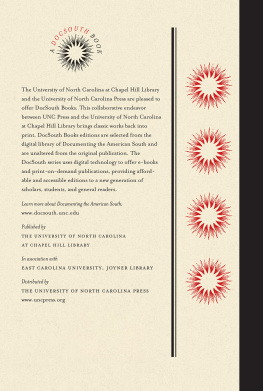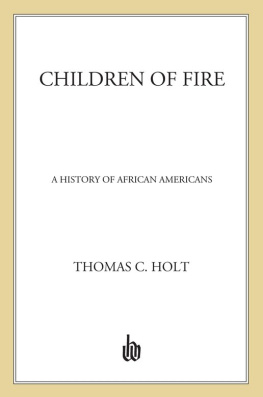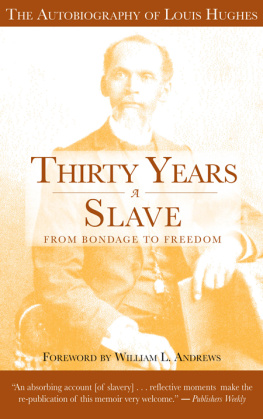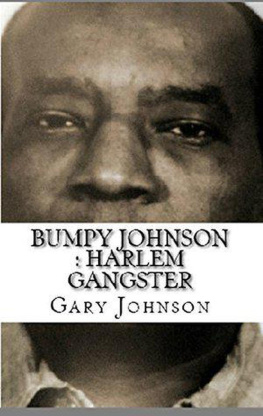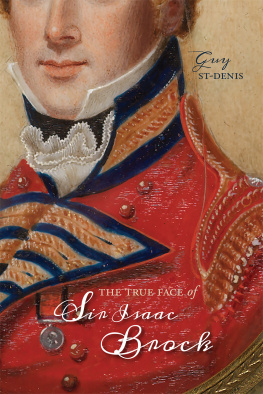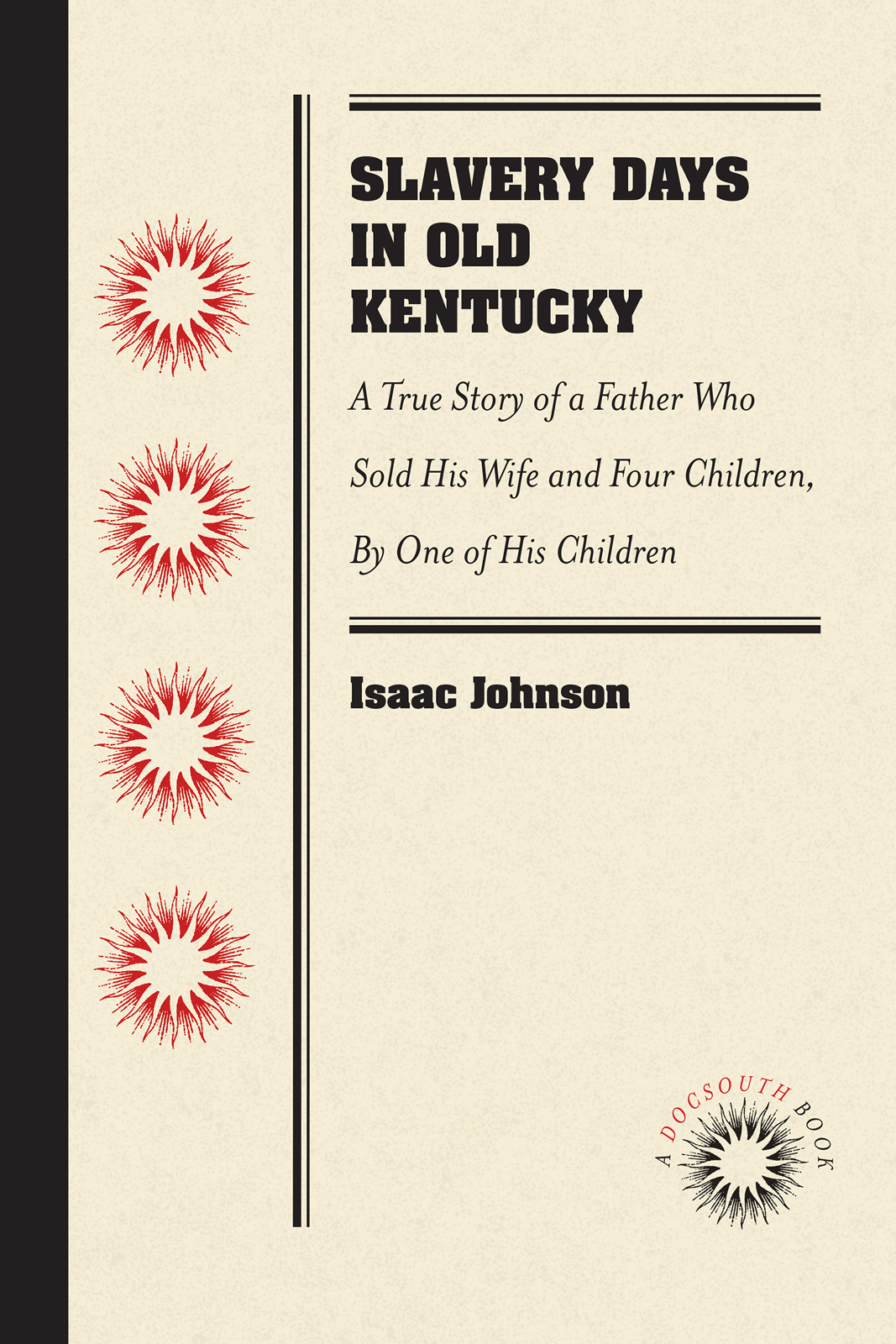This edition is made available under the imprint of DocSouth Books, a collaborative endeavor between the University of North Carolina at Chapel Hill Library and the University of North Carolina Press. Titles in Doc-South Books are drawn from the Librarys Documenting the American South (DocSouth) digital publishing program, online at docsouth.unc. edu. These print and downloadable e-book editions have been prepared from the DocSouth electronic editions.
Both DocSouth and DocSouth Books present the transcribed content of historic books as they were originally published. Grammar, punctuation, spelling, and typographical errors are therefore preserved from the original editions. DocSouth Books are not intended to be facsimile editions, however. Details of typography and page layout in the original works have not been preserved in the transcription.
DocSouth Books editions incorporate two pagination schemas. First, standard page numbers reflecting the pagination of this edition appear at the top of each page for easy reference. Second, page numbers in brackets within the text (e.g., [Page 9]) refer to the pagination of the original publication; online versions of the DocSouth works use this same original pagination. Page numbers shown in tables of contents and book indexes, when present, refer to the original works printed page numbers and therefore correspond to the page numbers in brackets.
Summary
Isaac Johnson was born in Elizabethtown, Nelson County, Kentucky, in 1844. His father was Richard Yeager, a white farmer, and his mother was Jane Johnson, an enslaved African from Madagascar. Although Jane Johnson was legally Yeagers property, the couple lived together as husband and wife and had four children, including Isaac Johnson. In 1851, Yeager, unable to face neighbors criticism of his domestic arrangement, sold Jane and their children to various new masters and left the area. Isaac Johnson, who had not previously been aware of his enslavement, was thus abruptly separated from his mother and siblings at the age of seven. After a succession of owners and two failed escape attempts, Johnson finally achieved freedom when, during the Civil War, he fled his masters plantation and found refuge with a Union regiment marching through Kentucky. These troops hired Johnson to assist them, and in February 1864, Johnson enlisted in the First Michigan Colored Infantry, which eventually became part of the 102nd United States Colored Regiment. Johnson served with this unit until the end of the Civil War, after which he moved to Ontario, Canada, and began working as a mason and stonecutter. In 1874, he married Theodocia Allen, with whom he had seven children. In 1884, Johnson and his family moved to Waddington, New York, where Johnson did the masonry work on Waddingtons Town Hall. In 1890, the Johnsons settled in Ogdensburg, New York. Isaac Johnson died of a heart attack there in December 1905.
In the preface to his 1901 autobiography, Slavery Days in Old Kentucky, Johnson explains that the present generation knows but little of actual slavery and has a tendency to surround the Institution with a glamour as though it possessed great intrinsic merits of value to both races (p. 5). Johnson is repulsed by such talk and insists that any system of human slavery is always degrading both to the master and the slave (p. 5). He explains that he wanted to publish descriptions of his experiences under slavery in order to combat romanticized nostalgia for slavery.
Johnson makes clear that the defining moment of his life was the day his happy family was scattered, without even the privilege of saying Good by to each other (p. 11). Johnson was sold to a William Madinglay for $700 and taken to his farm, where Johnson learns the realities of enslavement. For example, Madinglay explains that Johnson must always take off [his] hat and say yes, sir, or no, sir, and stand to one side when he meets a white man or else suffer a whipping (p. 17). After being hired out to various masters, Johnson ends up under the ownership of Madinglays brother John, the owner of almost 1, 000 acres on Kentuckys Beech Fork River. John Madinglay makes his 120 slaves work over 16 hours a day, explaining that if they defy his authority, his duty is to kill them, because killing a slave is the same thing as killing [a] mule (p. 26).
While working for John Madinglay, Johnson befriends Bob, a free Canadian engineer who was wrongfully arrested during a trip to New Orleans and sold into slavery. Bob tells Johnson about free life in Canada and eventually the two conspire to run away. Unfortunately, Bob is betrayed by a fellow slave, and both he and Johnson are eventually recaptured. Madinglay blames Bob for inciting the escape attempt, and Bob is whipped and then burned with hot coals before his throat is cut just enough so he would die gradually (p. 31). Bobs torture and murder exact an extreme psychological toll on Johnson, cementing his belief that slavery not only degraded the slave, but it degraded the master even more because masters resorted to such extreme violence in order to maintain control (p. 32).
The Civil War breaks out soon after Bobs death, and after another failed escape attempt, Johnson finally succeeds in running away from John Madinglays plantation. He attributes his success to Captain Smith of the Eighth Michigan, who gives Johnson both refuge and a job (p. 37). But while he mentions joining the Union Army in Detroit, he does not describe his soldiering days in any detail. Released by the Army at the end of the war, Johnson returns to Kentucky in search of his mother and siblings, but instead finds John Madinglay paralyzed and confined to bed. Johnson interprets Madinglays illness as proof of answered prayers, because God allows him to witness natures retribution on the man who so cruelly tortured and murdered his friend (p. 39).
Johnson never locates his mother or siblings; yet these lost family members remain central to his sense of identity as a free man. For example, Johnson refuses to take his fathers last name and instead uses his mothers name. His fathers betrayal also has a lasting effect on how Johnson identifies racially: I call only the colored people mine, he writes, describing white men such as John Madinglay and his father as repulsive, because they could sell [their] own children and would uphold a system that enabled [them] to do so (p. 40). Although Johnsons family remains separated, he never stops hoping for reunion: Slavery Days in Old Kentucky is published more than thirty years after the end of the Civil War, but Johnson concludes the narrative by printing his mailing address so that his relatives may know where to find [him] in case this little pamphlet should fall into their hands (p. 40).

